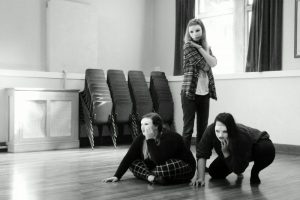Last Thursday, I returned to work after 8 days of strike action in a multi-issue industrial dispute. This dispute is of critical significance for the future pay and conditions of all who work in UK Higher Education in general, and for the value of my pension in particular. I am now ‘working to contract’ as part of the second phase the industrial action (also known as ASOS: ‘Action Short of a Strike’). My union is called The University and College Union (UCU).

UCU members on strike over pay and pensions marched towards the Universities UK headquarters on 4 December. Photograph: Guy Smallman/Getty Images
University academics’ contracts are very vague – they do not stipulate maximum weekly working hours or say much about what work is ‘compulsory’, as opposed to ‘voluntary’. On one reading of UCU’s guidelines, I should not even be writing blog posts. ASOS means I am not to perform ‘additional voluntary duties, such as out of hours cover, or covering for colleagues (unless such cover is contractually required)’. This and my next blog post might well be ‘an additional voluntary duty’: nobody in my university’s management is going to tell me I’m in breach of contract if I don’t publish a blog post during the period of ASOS. On the other hand, this blog is part of my general responsibility to do public engagement and outreach work (including the achievement of ‘impact’ as defined by the UK Research Excellence Framework – REF). That responsibility is also factored into my School’s current workload model. Because I am doing a lot of work for one of our REF impact case studies, I get some other kinds of labour taken off me: a sure sign that the impact activity work is ‘core’ rather than ‘voluntary’. Mind you, the REF case study is more to do with ancient drama than rhetoric or politics. So, I’ve mentioned my work on ancient drama at the end of this post so that I can more securely class it as non-voluntary work. If you follow up and read those links about drama, it will help to define my labour as purely ‘to contract’. Thanks in advance.
Another problem with blogging while taking ASOS: it is hard to know what my maximum ‘to contract’ weekly hours should be. Should I define my ‘to contract’ working hours as 36.25 per week? This is the figure for full-time employment quoted in my University’s policy documents, and yet it is a figure which it is hard for academics not to exceed by quite some way on a regular basis when they are working normally. Or should I go for 48 hours per week? This is the maximum number of hours per week stipulated in the Working Time Regulations 1998, and it is the ‘upper limit’ figure mentioned in UCU advice to their academic and academic-rated members about taking ASOS.
I am currently going for the 36.25 hours: that’s 7 hours and 15 minutes a day, from Monday to Friday. This is on the grounds that roughly ‘one-third of a Mary Beard’ sounds about right for a UCU member who is not ‘a mug’ and yet is taking part in ASOS. On either definition of ‘contracted hours’, though, writing for this blog uses up some of those hours in such a way that arguably even more ‘compulsory’ and essential work I have on my plate will be delayed even further than it already is. Oh well: causing delay and disruption is the point of ASOS, actually.
I think there’s a strong moral argument for using up some of my 36.25 hours to talk about Boris Johnson, Andrew Neil and Athenian democracy in my next blog post, even if does stretch the ASOS guidelines in my case. Extraordinary times do call for extraordinary measures. And my goodness, we really are witnessing some unusual episodes of the historical drama that is British democracy.

Three cast members of our ‘Greek Drama in the Community’ Project’ experiment with masks in the opening Chorus. Photograph: Ralph Anderson
Talking of drama, and while you’re here, I post below those aforementioned links to various projects, papers and resources which I’ve authored or had a hand in. If you find them useful, and (especially) if they change your understanding or the way you do things (e.g. in your work as an educator or a theatre practitioner or a learner) do drop me a line by email to tell me how. I’d also be interested to hear about what sort of resources or information you’d like to see on this blog or via links from it. My things are: Homer, Greek Tragedy and Comedy (and modern re-imaginings of them), Athenian democracy, Greek oratory and rhetoric. I also like to work with contemporary play-makers, performers and theatre educators.
- For a chapter-length introduction to the socio-political aspects of Greek and Roman Tragedy, see here [Jon Hesk ‘The Socio-political Dimension of Ancient Tragedy’, 2007, in The Cambridge Companion to Greek and Roman Theatre. McDonald, M. & Walton, J. M. (eds.). Cambridge University Press, p. 72-91.]
- For a couple of ‘open access’ recorded lectures (voice and powerpoint) which introduce you to Aristophanes’ Birds see here.
- For my lecture on ‘Morality, Politics and Religion in Euripidean Tragedy’ see this video and accompanying materials.
- For my lecture and materials on ‘Politics and Gender Conflict in Greek Drama’, see here.
- For some pdf resources for school teachers on Aristophanic Comedy see here: [the weird numbering of these resources is a reflection of the fact that there are more to come… eventually]
- Videos, brochure and blog posts concerning ‘Greek Drama in the Community’, an exciting ‘devised play’ project which myself and Ralph Anderson did with a local youth theatre group and their inspirational teacher Stephen Jones.
- My blog post/programme note on Zinnie Harris’ This Restless House: an amazing reworking of Aeschylus’ Oresteia which was performed in Scotland in 2016 and 2017.
